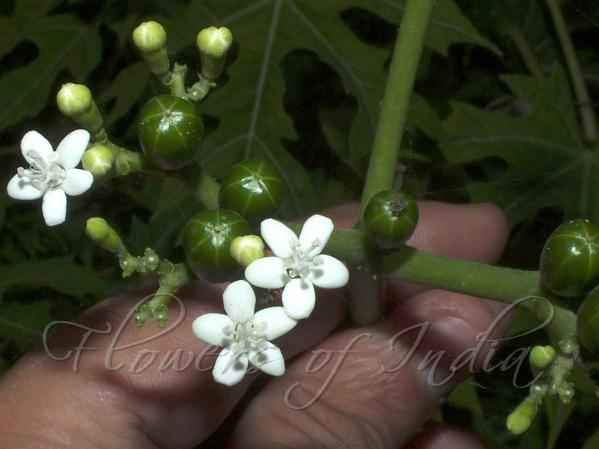|
| Tree Spinach |
|

|

| File size | 215566 |
| Original date | 9/13/17 5:08 PM |
| Resolution | 1240 x 930 |
| Flash | Flash fired |
| Focal length | 9.3mm |
| Exposure time | 1/4000s |
| Aperture | 11.0 |
| Focus Distance | 0.0m |
| Metering Mode | Multi-segment |
| Camera make | FUJIFILM |
| Camera model | FinePix HS35EXR |
| Sensor type | OneChipColorArea |
|
|
|
|
Photo: |
Botanical name: Cnidoscolus aconitifolius Family: Euphorbiaceae (Castor family)
Synonyms: Jatropha aconitifolia
Synonyms: Jatropha aconitifolia
Tree Spinach is a large, fast-growing leafy perennial
shrub that is believed to have originated in the Yucatán Peninsula of
Mexico. It has fleshy stems which exude a milky sap when cut. It can
grow to be 6 m tall, but is usually pruned to about 2 m for easier leaf
harvest. Leaves are alternate, simple, carried on stalks 10-30 cm long,
glandular at tip. Lead blades are very variable, 10-20 cm x up to 30
cm, shallowly or deeply 3-7-lobed, heart-shaped at base, rather thick
and fleshy when fresh, nearly hairless and normally without stinging
bristles, lobes pointed to tapering. Flowers are borne in dichotomous
cymes. Flowers are unisexual, regular, without petals; sepals 5, up to
1 cm long, looking like petals, white; male flowers with 10 united
stamens in 2 whorls; female flowers with superior, 3-celled ovary,
styles 3, fused at base. Fruit is an ovoid-spherical, bristly capsule.
It is a popular leaf vegetable in Mexican and Central American
cuisines, similar to spinach. The leaves should be cooked before being
eaten, as the raw leaves contain a high content of toxic hydrocyanic
acid. Up to 5 raw leaves can be eaten a day. To be safely eaten, the
required cooking time is 5-15 minutes.
Medicinal uses: The plant is said to have many
medicinal benefits, ranging from the ability to strengthen fingernails
and darken greying hair. It is also used to cure alcoholism, diabetes,
insomnia, skin disorders, venereal diseases, gout, scorpion stings and
to improve brain function and memory.
The plant is said to have many
medicinal benefits, ranging from the ability to strengthen fingernails
and darken greying hair. It is also used to cure alcoholism, diabetes,
insomnia, skin disorders, venereal diseases, gout, scorpion stings and
to improve brain function and memory.
Medicinal uses:
 The plant is said to have many
medicinal benefits, ranging from the ability to strengthen fingernails
and darken greying hair. It is also used to cure alcoholism, diabetes,
insomnia, skin disorders, venereal diseases, gout, scorpion stings and
to improve brain function and memory.
The plant is said to have many
medicinal benefits, ranging from the ability to strengthen fingernails
and darken greying hair. It is also used to cure alcoholism, diabetes,
insomnia, skin disorders, venereal diseases, gout, scorpion stings and
to improve brain function and memory. | Identification credit: Nidhan Singh | Photographed in cultivation in Panipat, Haryana. |
• Is this flower misidentified? If yes,